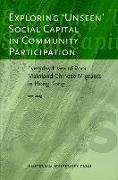Read more
Klappentext This volume argues that using social capital to eradicate poverty is unlikely to succeed because its mainstream approach mistakenly assumes that social capital necessarily benefits poor people. The inadequacy of that assumption, Sam Wong argues, calls for a reassessment of human motivations, institutional dynamics, and the complexity of structures in social capital building. Proposing a "pro-poor" perspective, in which poverty-specific outcomes are highlighted, he suggests an exploration of "unseen" social capital is in order--not only to challenge the mainstream understanding of "seen" social capital, but to demonstrate the need for everyday cooperation, which is shaped by social norms, influenced by conscious and unconscious motivations, and subject to changes in priority based on livelihood. A useful volume for both policy makers and practitioners, "Exploring 'Unseen' Social Capital in Community Participation "offers a fresh perspective in thinking about civic and social agency. Inhaltsverzeichnis Summary contents[-] - 6[-]Detailed contents[-] - 8[-]Acknowledgements[-] - 14[-]Preface[-] - 16[-]Ch. 1: Building a 'Pro-Poor' Social Capital Framework[-] - 18[-]Ch. 2: Ethnography - Alternative Research Methodology[-] - 48[-]Ch. 3: Historical and Cultural Contexts of Mainland Chinese Migrants in Hong Kong[-] - 74[-]Ch. 4: Investing in Social Capital? - Considering the Paradoxes of Agency in Social Exchange[-] - 98[-]Ch. 5: 'Getting the Social Relations Right'? - Understanding Institutional Plurality and Dynamics[-] - 124[-]Ch. 6: Rethinking Authority and Power in the Structures of Relations[-] - 148[-]Ch. 7:[-]Conclusions and Policy Implications - 174[-]Notes[-] - 196[-]Bibliography[-] - 198[-]Annex 1[-] - 210[-]Annex 2: List of Tables[-] - 214[-]Index[-] - 218

